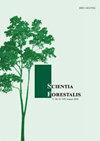Photosynthetic acclimatization to cyclical water deficit in rubber tree seedlings
IF 0.4
4区 农林科学
Q4 FORESTRY
引用次数: 1
Abstract
Plants subjected to successive water deficit cycles may be able to rapidly develop acclimatization responses. Thus, the objective of this study was to analyze the acclimatization capacity of the photosynthetic machinery of rubber tree seedlings submitted to water deficit cycles (WDC). To do so, we designed four treatments: control plants (fully irrigated, CT); 0P (not previously submitted to any WDC); 1P (previously submitted to one WDC); and 2P (previously submitted to two WDC). The water deficit cycle was characterized by suspending irrigation until rubber tree net assimilation rate (A) reached zero (A≤0). Then the plants were rehydrated until substrate moisture reached its maximum water retention capacity, and the irrigation was maintained until the rate A of the plants recovering from water deficit reached 90% of the rate of the control plant, and then a new cycle of water deficit started again. In the third and last cycle (WDC3), treatments 0P, 1P and 2P were simultaneously subjected to water deficit and comparative eco-physiological evaluations between treatments when each group of plants reached A≤0. After WDC3, 2P plants achieved greater A, stomatal conductance, transpiration and intrinsic efficiency of water use after 21 days, compared to 1P and 0P plants. The leaves of treatments 2P and 0P showed the same relative water content (RWC), higher photosynthetic pigment concentration, and 2P showed greater water absorption capacity in the substrate under low water availability, maintaining high A values in comparison with the other treatments 36 days after the start of WDC3. The results indicate that the 2P plants showed acclimatization of the photosynthetic machinery in maintaining a positive carbon balance when subjected to WDC, indicating that leaf turgor was maintained through cellular and osmotic adjustment, accumulation of photosynthetic pigments and greater soil water absorption capacity.橡胶树幼苗光合适应对周期性水分亏缺的影响
遭受连续水分亏缺循环的植物可能能够迅速产生适应反应。因此,本研究旨在分析橡胶树幼苗在水分亏缺循环(WDC)条件下光合机制的适应能力。为此,我们设计了四种处理方法:对照植物(完全灌溉,CT);0P(之前未提交给任何WDC);1P(之前提交给一个WDC);和2P(之前提交给两个WDC)。水分亏缺循环以暂停灌溉为特征,直到橡胶树净同化率(A)达到零(A≤0)。然后对植株进行再水化处理,直到基质水分达到最大保水能力,并保持灌溉,直到植株从亏水中恢复的速率A达到对照植株的90%,再开始一个新的亏水循环。在第三个和最后一个周期(WDC3)中,当各组植物达到A≤0时,同时进行处理0P、1P和2P的亏水处理和处理间比较生态生理评价。WDC3处理后,与1P和0P植物相比,2P植物在21 d后的A值、气孔导度、蒸腾和内在水分利用效率更高。WDC3启动36 d后,与其他处理相比,2P处理和0P处理的叶片相对含水量(RWC)相同,光合色素浓度较高,在低水分有效度条件下,2P处理对基质的吸水能力更强,保持较高的A值。结果表明,在WDC条件下,2P植物表现出了光合机制的适应性,维持了正碳平衡,表明叶片膨胀是通过细胞和渗透调节、光合色素积累和土壤吸水能力增强来维持的。
本文章由计算机程序翻译,如有差异,请以英文原文为准。
求助全文
约1分钟内获得全文
求助全文
来源期刊

Scientia Forestalis
Agricultural and Biological Sciences-Forestry
CiteScore
1.00
自引率
0.00%
发文量
39
期刊介绍:
Scientia Forestalis is a scientific publication of the IPEF – Institute of Forest Research and Studies, founded in 1968, as a nonprofit institution, in agreement with the LCF – Department of Forest Sciences of the ESALQ – Luiz de Queiroz College of Agriculture of the USP – São Paulo University. Scientia Forestalis, affiliated to the ABEC – Brazilian Association of Scientific Publishers, publishes four issues per year of original papers related to the several fields of the Forest Sciences.
The Editorial Board is composed by the Editor, the Scientific Editors (evaluating the manuscript), and the Associated Editors (helping on the decision of acceptation or not of the manuscript, analyzed by the Peer-Reviewers.
 求助内容:
求助内容: 应助结果提醒方式:
应助结果提醒方式:


